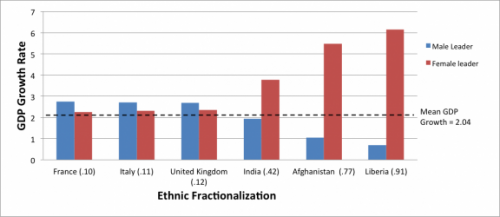Countries with a lot of ethnic diversity generally show weaker economic growth than homogeneous countries. A new study, however, discovered a variable that strongly reverses the trend: women leaders.
Management professor Susan Perkins and her colleagues compared the economic growth rate of 139 countries over 55 years. They found that diverse countries did significantly better when a woman was at the helm. The more diverse the country, the stronger the effect.
Perkins and her co-authors cautiously attempt to explain their data (here), but think that it may have something to do with leadership style. Female leaders have been shown to be more collaborative and non-authoritarian than men. Co-author Nicholas Pearce speculates:
In countries with a lot of internal conflict, oftentimes people are looking for signals that the person in charge is going to be collaborative and not dictatorial or self-interested. Women’s gender role is symbolic of collaboration, that they’re going to empower marginalized voices.
Because of gender stereotypes, then, women may seem more trustworthy. Meanwhile, real differences in leadership style may affirm those expectations and be more effective in practice.
Lisa Wade, PhD is an Associate Professor at Tulane University. She is the author of American Hookup, a book about college sexual culture; a textbook about gender; and a forthcoming introductory text: Terrible Magnificent Sociology. You can follow her on Twitter and Instagram.

Comments 18
Richard Gadsden — April 8, 2014
This is Heads of Government, not Heads of State. The UK has had a female Head of State throughout the entire study period (since 1952), but only had a female Head of Government 1979-1990.
I note that the source article refers to "leader", not to "head of state"; the error clearly was introduced on socimages.
Anna — April 8, 2014
This is interesting, but Afghanistan and India are in close proximity to each other with many shared historical trajectories. Same thing with the three European countries/state. The inclusion of Liberia is just too random to account for making ethnic diversity a central focus over proximity and shared socio-politics.
There are various countries around the world with similarly high levels of either homogeniety or diversity, but that are disparate from each other in terms of proximity and socio-cultural history. This research needs to include more such countries in order to make the correlation more convincing.
On an unrelated note, expressions like "leaders" or "at the helm" need to be used far more carefully in a cross-cultural context. Terminology such as head of state, president, etc. can mean wildly different roles, ranking, and level of leadership and responsibility in different countries.
GetIt Right — April 8, 2014
Please, do not confuse correlation with causation. The "study" lacks any sort of instrumental variable, fails to mention potential endogeneity, and is basically plagued with deep econometric faults. Do not take this research seriously.
Karl — April 9, 2014
"Perkins and Pearce make no claims to establishing a causal relationship between ethnic diversity, female leadership, and improved GDP performance. 'It’s a compelling correlation, but further work needs to be done to figure out what drives the phenomenon,' Pearce says. The number of female leaders in the dataset—61 out of a total of 1,338 surveyed over fifty-five years—was also relatively small."
Looks like they were pretty up front about the statistical weakness of the dataset. It might be a while before a more robust amount of date can be compiled, assuming heads of state are elected more or less every 4-8 years.
Not that the researchers are explicitly saying this, but personally I think pointing to GDP performance is a really bad justification for electing more women to high office. In modern democratic governments politicians should be representative of the people and since women make up more than half the population (in most countries) there should be more women in politics. It needs no further justification.
In fact, making "performance" based arguments has the distinct possibility of undermining the moral imperative to make government more diverse.
What if, just for arguments sake, a study could present a conclusion that female heads of state faired worse in an certain criteria than their male counterparts. Should that even be taken seriously as a reason to elect more men? If not, then I see no reason why the obverse would be any more compelling.
Also, who was the female leader of Afghanistan indicated in the graph?
Bill R — April 9, 2014
We give our leaders too much credit and too much blame for outcomes that are shaped by a very large number of variables. It is a simple explanation for complex phenomena--and it is wrong.
Jamie Riehl — April 9, 2014
I think the N is just too small here. Britain has had a single female head of state (nicknamed The Iron Lady). She was awful, and hated collaboration. Liberia has also had a single female head of state (also nicknamed The Iron Lady) and she is amazing and owes her presidency in no small part to her ability to collaborate between Muslims and Christians.
ThisMachineKillsLeftists — April 11, 2014
Empathy is not always a positive value, much less tolerance.
Assuming the handful of female leaders around the world are an adequate statistical pool, diverse countries are inferior to begin with. There isn't a single diverse country that wouldn't be better off if it was more homogenous. The very fact that you need a woman up there to make various groups feel less intimidated/divided is precisely why diversity is weakness, not strength.
Georgia — September 28, 2023
Fascinating! I can definitely see how gender diversity in governance can lead to to better outcomes for the wider public, as more voices get heard in different areas. The economy in Canada could certainly use some of this right now, to keep such affordable tree services and gas prices. And at the end of the day equality is a major goal even at the sacrifice of the economy.